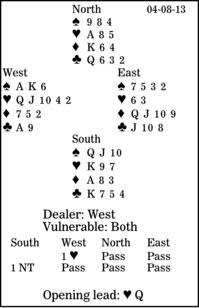Bridge column, April 8: In the last seat, three calls change

At the bridge table, when the dealer's opening bid of one of a suit is followed by two passes, the fourth player is in the balancing seat. Three of his actions have different meanings from those in the second position -- two upward and one downward.
Over the next three days, let's look at these calls. First, an overcall of one no-trump.
After West opened one heart, if North had overcalled one no-trump, it would have shown some 15.5 to 17.5 points (about half a point more than the strength promised by a one-no-trump opening bid). But in the balancing (or pass-out) position, it is a weak no-trump, indicating only 11 to 15 points -- like the South hand in this deal.
North, with nine points, would have raised opposite a second-seat one-no-trump overcall, but now has an easy pass.
West leads the heart queen. South sees only four top tricks: two hearts and two diamonds. The spade suit will generate one more trick, but it is better to attack clubs. And since West surely holds the ace, declarer should win the second (or first) heart trick in his hand with the king and lead a low club to the queen. After it wins, he returns a club and plays low from his hand. When the ace comes tumbling down, the contract is home.
** ** **
COPYRIGHT: 2013, UNITED FEATURE SYNDICATE
DISTRIBUTED BY UNIVERSAL UCLICK FOR UFS

